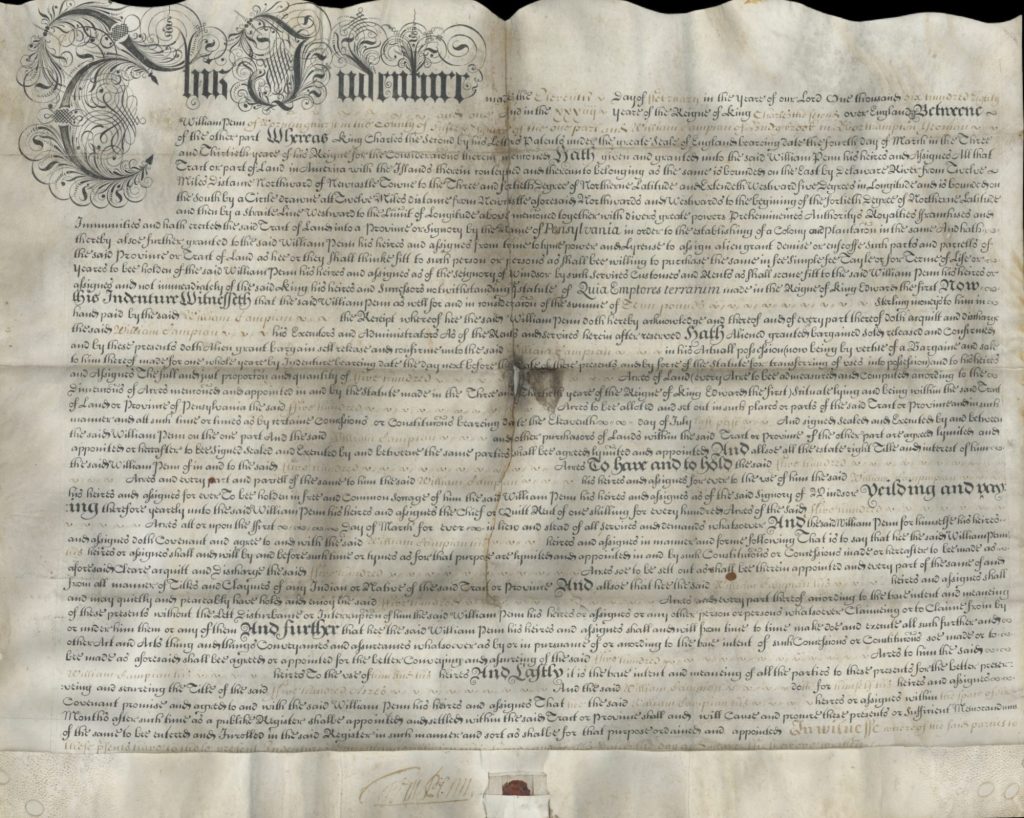William Penn Grants One of the Original Plots of Land in Pennsylvania, a Site to Be Inhabited by Betsy Ross’s Great-grandfather


One of the scarce early grants from prior to May 1682, when the list of the first purchasers was compiled
Upon receiving his grant for Pennsylvania from King Charles II in March 1681, William Penn immediately set about attracting investors and settlers. To pay expenses and realize a profit from his enterprise, Penn had to sell land. The “First Purchasers” who responded to his promotional tracts provided essential economic support for Penn’s...
Upon receiving his grant for Pennsylvania from King Charles II in March 1681, William Penn immediately set about attracting investors and settlers. To pay expenses and realize a profit from his enterprise, Penn had to sell land. The “First Purchasers” who responded to his promotional tracts provided essential economic support for Penn’s “Holy Experiment”, in which he believed so wholeheartedly. To arouse interest in Pennsylvania, Penn, in April, 1681, just after the charter was issued, published his first promotion tracts, “A Brief Account of the Province of Pennsylvania” and “Some Account of the Province of Pennsylvania in America”. These tracts were quickly followed by eight others, all of which were printed before the end of September 1681. Penn, the Proprietor, convinced that land must be made available to rich and poor alike, offered tracts in denominations as small as one hundred twenty-five acres. As further evidence of his sincerity he refused, in September 1681, the offer of £6,000 from a Maryland group for a tract of 30,000 acres and a monopoly of the Indian trade within the area from the Delaware to the Susquehanna. Penn was to have two and a half per cent of the profits on the trade, so he gave up a lot to make his dream commonwealth a reality.
As Penn traveled about propounding his Holy Experiment during the spring of 1681, it seemed wise for him to enter into a formal agreement with those who would become First Purchasers. Consequently, in July 1681, the Conditions and Concessions were issued. On his part, Penn agreed to clear the Indian title on 500,000 acres of land, then to lay out a principal city wherein each purchaser would receive ten acres of land for each five hundred purchased. For those settling in groups, two hundred acres would be set apart for a village in each tract of 10,000 acres. The several towns and villages would be connected by highways, the right of way being donated by the Proprietor. Each man’s land would be located with access to a navigable stream and to a village. Penn reserved 10,000 acres of every block of 100,000 acres for his own use and, later, many of these tenths became proprietary manors.
In 1681 Penn told prospective Pennsylvania colonists, “You shall be governed by laws of your own making, and live a free and, if you will, a sober and industrious people. I shall not usurp the right of any, or oppress his person.” He promised, “Whatever sober and free men can reasonably desire for the security and improvement of their own happiness I shall heartily comply with…” The response to Perm’s offer to sell lands to prospective colonists was amazing. By May 1682, when the first lists of purchasers were compiled, 566,000 acres had been sold. Penn offered for sale initially fifty blocks of land, each of which contained 10,000 acres. Parcels of land sold to individuals ran as small as one hundred twenty-five acres. The most popular denominations were for 125, 250, 500, 1,000, 1,250, 1,500, 2,500, and 5,000 acres. As land sold at the rate of £100 for 5,000 acres, the large purchasers paid £100 or more; the medium-sized purchaser paid £20 for 1,000 acres; while the small purchaser paid £10 for 500 acres or half that sum for 250. During the founding period, then, Pennsylvania was a colony of settlers, not of land speculators. Indeed, more than fifty per cent of the First Purchasers actually came to Pennsylvania and settled there. Many were members of the Free Society of Traders in Pennsylvania, Quakers who invested in the new colony and intended to have a say in its direction.
In that first, pre-1682 group of purchasers was William Campion. Large document signed, England, February 11, 1682, being an original indenture for a plot of land in Pennsylvania, with Penn’s seal intact. The document gives the parties as, “William Penn of Worminghurst in the County of Sussex, Esq., on the one part, and of William Campion, Budge-brook, Northampton, yeoman, of the other part” and gives the grant as being for 500 acres. The Commonwealth of Pennsylvania’s list of the original purchasers from William Penn mentions Campion and states that his grant was in Philadelphia County.
Campion apparently transferred his rights, as it lists Andrew Griscomb (also spelled Griscom) as taking the land. Griscom was a carpenter, and both Griscom’s son and grandson became respected carpenters as well. They both have their names inscribed on the wall at Carpenters’ Hall in Philadelphia. Andrew Griscom was the great-grandfather of Betsy Ross.

Frame, Display, Preserve
Each frame is custom constructed, using only proper museum archival materials. This includes:The finest frames, tailored to match the document you have chosen. These can period style, antiqued, gilded, wood, etc. Fabric mats, including silk and satin, as well as museum mat board with hand painted bevels. Attachment of the document to the matting to ensure its protection. This "hinging" is done according to archival standards. Protective "glass," or Tru Vue Optium Acrylic glazing, which is shatter resistant, 99% UV protective, and anti-reflective. You benefit from our decades of experience in designing and creating beautiful, compelling, and protective framed historical documents.
Learn more about our Framing Services










































































































